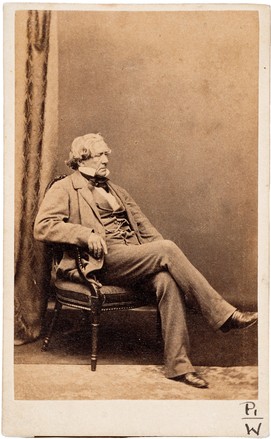
William Charles Wentworth
1861–62
P1 / 1934
Carte de visite
P1 / 1934
Carte de visite
The wealthy pastoralist and statesman William Charles Wentworth (1790 – 1872) arose from a difficult start as the illegitimate son of surgeon father, D’Arcy Wentworth and convict mother, Catherine Crowley. Despite the advantages that came with his father’s status as a free settler and respected official in the colony, William spent much of his life striving for respectability in the eyes of colonial society, whilst fighting against the dominance of the ruling elite.
Although he spent most of his life in England, William went on to become one of New South Wales’ most acclaimed explorers, and one of the colony’s most important colonists. This photograph was captured at the height of Wentworth’s influence during his final visit to Sydney in 1861-1862 when he and his wife were finally accepted into Sydney’s upper class. The act of having his portrait taken in this relaxed and distinguished pose, might well reflect that this was one of the most triumphant moments his life.
Cartes de visites (visiting cards) such as these were the most popular form of photograph in the 19th century. They were originally used in the same way as traditional calling cards, but became wildly popular as novelty items to collect and exchange amongst groups of friends. Carte de visite photographs of famous or distinguished people were particularly sought after.


 Back to list
Back to list